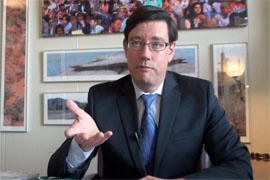Cronkite News has moved to a new home at cronkitenews.azpbs.org. Use this site to search archives from 2011 to May 2015. You can search the new site for current stories.
House bill aims to help Arizona families pay for long-term care
PHOENIX – After his mother was diagnosed with dementia, Steve Farley said he learned firsthand how much it costs a family to provide a loved one with long-term care.
In the three years before she died, Farley, his siblings and his stepfather cared for her as best they could and then, at considerable expense, placed her in an assisted-living facility.
“The whole process certainly woke me up to the whole system of how we take care of our elders,” said Farley, a Democratic representative from Tucson.
He said that experience inspired him to sponsor a bill that would help families care for aging family members.
HB 2713 would allow Arizonans to subtract long-term care insurance premiums and money deposited into long-term care savings accounts from taxable income on their state returns.
The measure received an endorsement from the House Health and Human Services Committee and was awaiting action by the full House.
Farley, who is running for the U.S. House of Representatives, said the change is necessary because people in poverty qualify for the Arizona Long Term Care System (ALTCS), and people who are rich can afford the $80,000 to $90,000 per year a nursing home can cost.
“If you’re in the middle class there are no good options,” he said. “Either you can impoverish yourself to qualify for ALTCS or you can try to pay for it yourself, but you’re going to end up impoverishing yourself eventually.”
Kathleen Collins Pagels, executive director of the Arizona Health Care Association, said the bill won’t solve all challenges associated with elder care but is a start.
“Right now people don’t have resources,” Pagels said. “They spend down until they qualify for ALTCS, and then they don’t have any choices with their care. Long-term care insurance would provide choices.”
A solution such as the one proposed by Farley would take the strain off of government programs that must pay for people’s health care, she said.
Guy Mikkelsen, president and CEO of the Foundation for Senior Living, said that the bill is well-intentioned but that adequately funding programs for seniors offered through the Arizona Department of Economic Security would accomplish much more.
“I’m not going to say ‘Don’t help the cause’ but it won’t make a big impact,” Mikkelsen said.
Tim Schmaltz, coordinator of Protecting Arizona’s Family Coalition, said Farley’s proposal would help because the U.S. is one of few industrialized nations that doesn’t have a good long-term care program. But he said it wouldn’t help poor people who lack the resources to pay into long-term care savings accounts or cover long-term care insurance premiums.
“As the baby boomers age, this is going to turn into a bigger problem,” he said.








